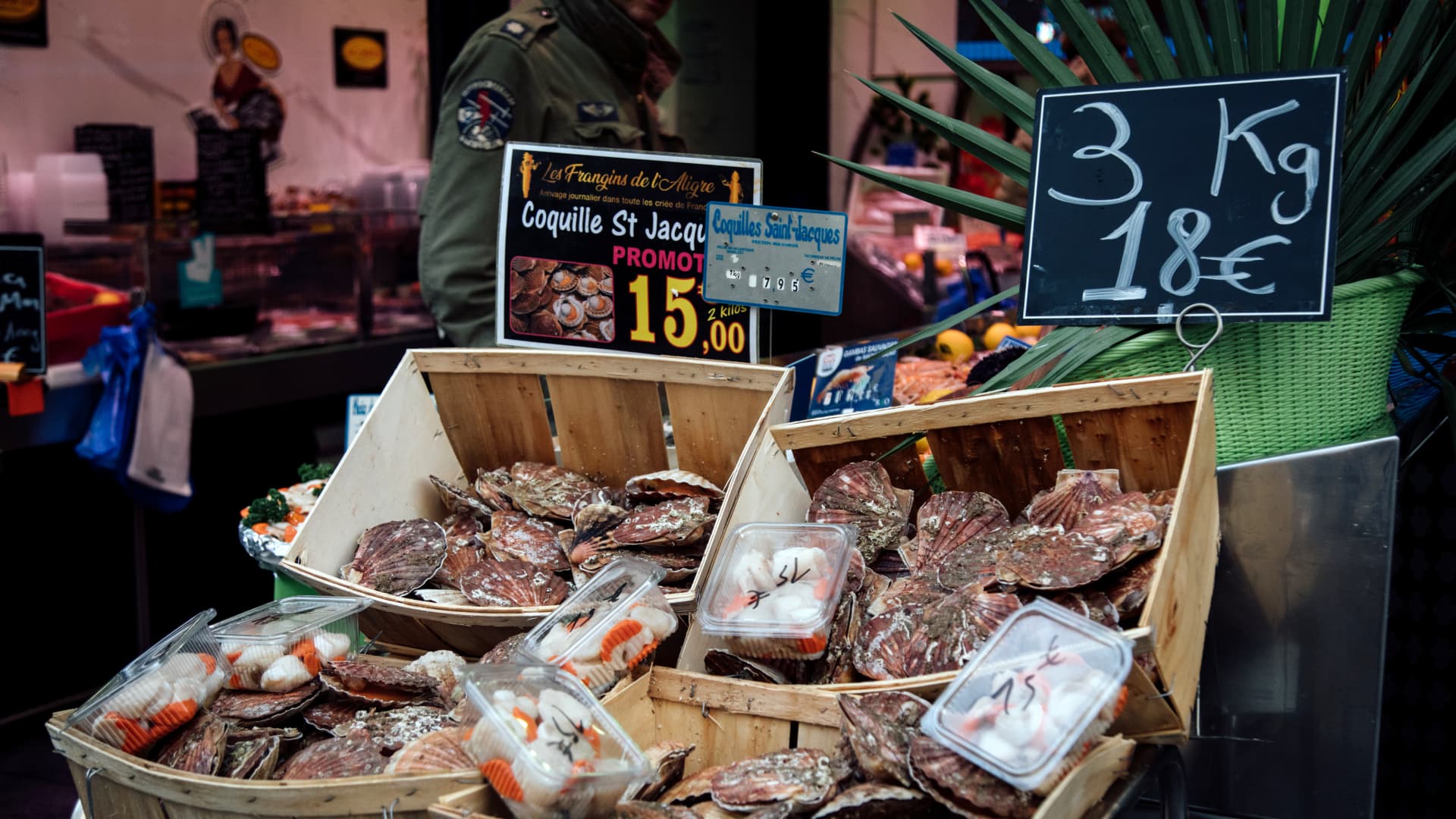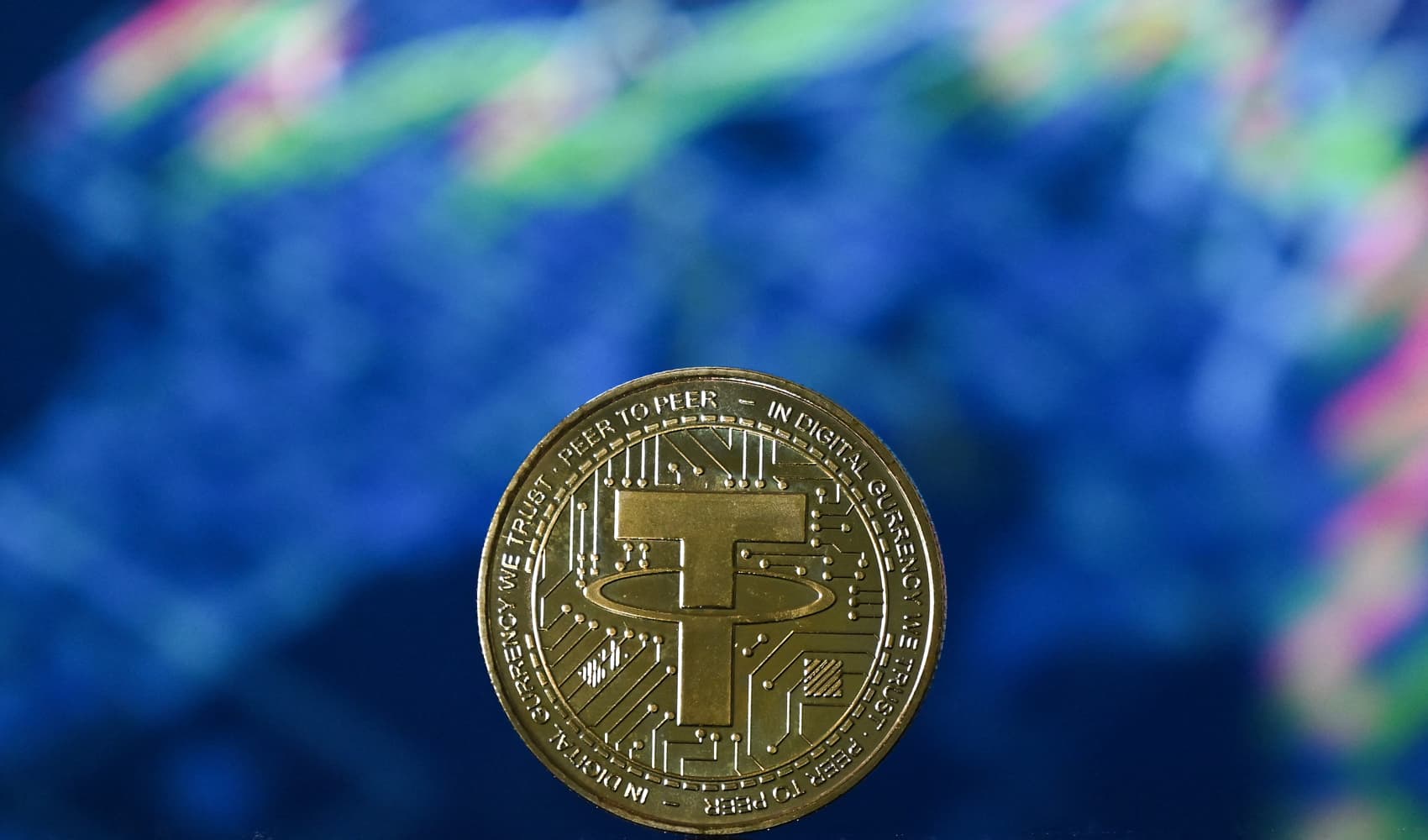
Traders work on the floor of the New York Stock Exchange (NYSE) on February 27, 2023 in New York City.
This is CNBC's live blog covering European markets.
European markets closed lower Tuesday after a mainly muted session with investors focused on new data, interest rates and some more specific corporate news.
The pan-European Euro Stoxx 600 closed down by 0.3%, with the blue-chip index closing the month 2.07% higher.
Watch NBC 4 free wherever you are
On Tuesday, health care stocks lost 1.5% over the course of the day, while several sectors swung to gains, including banks, which rose 1.4%.
Santander closed 4.8% higher after announcing plans to raise its return on tangible equity ratio in the coming years.
Get Tri-state area news delivered to your inbox with NBC New York's News Headlines newsletter.
Inflation figures from France and Spain came in hotter than expected for February, with price rises accelerating on an annual and monthly basis in both countries.
The U.K.'s FTSE index and the pound were closely watched after British Prime Minister Rishi Sunak on Monday signed a new trade deal with the European Union designed to remedy problems caused by the Northern Ireland Protocol.
Money Report
February has seen declines for major U.S. indexes. On Tuesday the Dow Jones Industrial Average fell. Meanwhile, Asia-Pacific markets closed mostly higher as investors digested key economic data across the region.
Santander exec chair: Value creation in banking will now move to Europe; shares up 4.7%
Santander Executive Chair Ana Botin told CNBC that value creation would be moving to Europe after the U.S. and Brazil have created "huge value" for its customers in previous years.
"Diversification is very valuable to shareholders and customers," Botin said, as she reflected on Santander's announcement that it would raise its return on tangible equity ration (ROTE) for 2023 to 2025.
"The value of the group is very evident," Botin added.
Botin was keen to emphasize that the global nature of Santander's network would help the bank to "outperform its competitors" despite the last couple of years painting a "very difficult scenario."
"The global Santander network … is really helping Spain, the U.S., the U.K., Brazil be more profitable and grow in a better way," Botin said.
Shares of Santander were up 4.7% just after 3 p.m. London time.
— Hannah Ward-Glenton
U.S. stocks open flat
U.S. stocks were flat on Tuesday as investors braced for the final trading day of February.
Futures tied to the Dow Jones Industrial Average rose 15 points, or 0.05%, while S&P 500 futures hovered below the flat line and Nasdaq 100 futures slipped by 0.1%.
Travis Perkins CEO: Pipelines remain robust in construction sector
Travis Perkins CEO Nick Roberts argues he sees long-term fundamentals for growth in the U.K., as he outlines why his group is prepared to handle short-term volatility.
Now time to get into bonds to add stability and decent yield: Portfolio manager
Matthew Eagan, portfolio manager at Loomis Sayles, discusses the investment outlook for fixed income.
Swiss economy stagnates in fourth quarter
The Swiss economy flatlined in the fourth quarter, the government said Tuesday, as a "challenging international environment" pressured manufacturing and exports.
The 0% growth was down from a 0.2% expansion in the third quarter. Manufacturing contracted by 0.3% in the fourth quarter, with exports 0.9% weaker. Initial figures show the overall Swiss gross domestic product expanded by 2.1% last year, adjusted for seasonal and calendar effects and sporting events — compared to 3.9% in 2021.
"While economic performance in 2022 was boosted by the recovery from the pandemic, at the same time it was held back by the tense energy situation in Europe and a gloomy international environment," the government said.
"The catch-up effects were particularly evident in services and private consumer spending, which grew significantly despite higher inflation rates."
The Swiss Secretariat for Economic Affairs in December projected that the national economy would expand by 1% this year, followed by 1.6% in 2024.
— Ruxandra Iordache
Dozens of varieties of chatbot will launch in coming months, Intel SVP says
Nick McKeown, senior vice president at Intel's Network and Edge Group, discusses artificial intelligence and chatbots, cloud computing developments and 5G.
Stocks on the move: Aixtron up 11.5%, Ocado down 10.6%
A double-digit growth forecast powered Germany-based semiconductor industry supplier Aixtron to the top of the Stoxx 600 index.
Shares of the company were up 11.5% in mid-morning trade following its full-year results, which also showed an 8% revenue increase and 6% net profit growth.
Grocery delivery firm Ocado was at the opposite end of the index, shedding 10.6% after reporting a £501 million ($605 million) pre-tax annual loss, worse than analysts expected. That's greater than the £176.9 million loss in 2021.
— Jenni Reid
UK grocery inflation at 17.1%; supermarkets ration vegetables in light of shortages
Inflation on U.K. groceries surpassed 17% in the month to Feb. 19, according to a survey by consultancy Kantar.
A quarter of Brits surveyed said they were struggling financially, up from one in five a year ago.
Meanwhile, the last week has seen U.K. supermarkets begin to limit customer purchases of certain fruit and vegetables amid shortages, primarily attributed to poor weather in Northern Africa and southern Europe and high energy costs hitting heated greenhouses.
"Food and drink currently make up quite a large part of inflation pressure on households," James Walton, chief economist at the Institute of Grocery Distribution, told CNBC, particularly for less-well off households who spend more of their monthly budget on food.
However, he noted any potential price rises due to shortages in fresh fruit and vegetables would not necessarily fuel core inflation, since they make up a relatively small section of the overall gauge.
— Jenni Reid
French and Spanish inflation rise more than expected

French inflation came in at 7.2% year on year in February on a harmonized basis, up from 7% in January and a record for the country.
Monthly inflation rose from 0.4% to 0.9%, while analysts had forecast prices to rise at a steady rate. Food prices rose by 14.5% on the year, official statistics showed, up from 13.3% last month.
Last week, French Finance Minister Bruno Le Maire met retailers to discuss ways to prevent food prices from rising much further, setting a March 15 deadline for a plan.
Meanwhile Spanish inflation also came in hotter than forecast on Tuesday, with core annual inflation increasing from 7.5% to 7.7%. The monthly figure shot up from a 0.2% price fall to 0.7% inflation.
— Jenni Reid
Staffing group Adecco says hiring activity 'softened' in January
European staffing group Adecco said there were signs that hiring activity had "softened" in January, as it reported its full-year earnings.
Despite the potential slowdown, Coram Williams, CFO of Adecco Group, told CNBC that the "talent market" remains very dynamic.
— Katrina Bishop
Finland slipped into recession last year
Finland's economy slipped into technical recession in the second half of last year, according to data from national agency Statistics Finland.
The country's gross domestic product contracted by 0.6% in the October-December period, after falling by 0.3% across July-September.
"Russia's attack on Ukraine and the rapid rate of inflation weakened both consumers' and entrepreneurs' confidence in the future," Finland Statistics said.
Finland's economy grew by an overall 2% in 2022.
— Ruxandra Iordache
European markets open lower
European markets were downbeat in early trade, with sectors a sea of red and the Stoxx 600 index shedding 0.45%. Auto stocks led losses, while oil and gas bucked the trend to rise 0.5%.
France's CAC 40 and Germany's DAX were both down around 0.5%, while the U.K.'s FTSE 100 lost 0.35%.
— Jenni Reid
Credit Suisse ‘seriously breached’ obligations in Greensill case: Swiss regulator
Credit Suisse "seriously breached its supervisory obligations" through its business relationship with financier Lex Greensill and his companies, Switzerland's FINMA regulator said Tuesday.
The Swiss lender's exposure to the London-based Greensill Capital resulted in massive reimbursements to investors after the supply chain finance firm collapsed in early 2021.
"This marks an important step towards the final resolution of the SCFF issue," Credit Suisse CEO Ulrich Körner said. "FINMA's review has reinforced many of the findings of the Board-initiated independent review and underlines the importance of the actions we have taken in recent years to strengthen our Risk and Compliance culture. We also continue to focus on maximizing recovery for fund investors."
— Elliot Smith
Hong Kong to end mask mandate from March 1
Hong Kong will end its mask mandate for indoors and outdoors on Wednesday, March 1 – its Chief Executive John Lee said in a briefing.
When asked for the reasoning behind the timing, Lee cited "overall assessment" and emphasized that the government had previously said it would be closely monitoring the situation.
Mask rules for hospitals and nursing homes will be "added administratively," Lee said.
– Jihye Lee
CNBC Pro: 'Pretty bearish on Tesla': Market pro says price cuts will hit the EV giant's share price
Tesla shares are unlikely to make a comeback in part due to the price cuts the EV maker announced late last year, according to veteran investor Mark Hawtin.
GAM Investments' Hawtin also told CNBC's Pro Talks that he thinks the automaker's stock is unlikely to rise back to $300 in the medium term.
CNBC Pro subscribers can read more about his thesis and why some analysts share that view.
— Ganesh Rao
CNBC Pro: Semiconductors, A.I. and more: These top-rated ETFs offer a way to play tech's hottest trends
Two tech themes have taken Wall Street by storm so far this year.
One is the return of semiconductor stocks, as demand bounces back for chips; the other is artificial intelligence, following the buzz surrounding chatbot ChatGPT.
CNBC Pro screened for the highest-rated ETFs with exposure to semiconductor and/or AI-related stocks (among others) using Morningstar data. The resulting funds all received a four- or five-star rating by Morningstar, and have performed well over the past three years.
CNBC Pro subscribers can read more here.
— Weizhen Tan
European markets: Here are the opening calls
European markets are heading for a positive open Thursday, tracking modest gains on Wall Street.
The U.K.'s FTSE 100 index is expected to open 36 points higher at 7,940, Germany's DAX 18 points higher at 15,419, France's CAC up 8 points at 7,308 and Italy's FTSE MIB up 36 points at 27,504, according to data from IG.
Earnings are set to come from Ocado, Bayer, Man Group, Adecco Group, Atos and Bunzl and data releases include French and Spanish inflation data for February and Germany's revised gross domestic product figures for the fourth quarter.
— Holly Ellyatt
The bear market could resume in March, says Morgan Stanley's Wilson
The stock market's recent attempt to pull out of a downtrend could soon come to an end, according to Morgan Stanley.
Mike Wilson, the firm's chief U.S. equity strategist, said in a note to clients Monday that the S&P 500 is on the verge of falling back into a bear market.
"With the equity market showing signs of exhaustion after the last Fed meeting, the S&P 500 is at critical technical support. Given our view on earnings, March is a high risk month for the bear market to resume," Wilson said.
For more, read the full story on CNBC Pro.
—Jesse Pound, Tanaya Macheel






